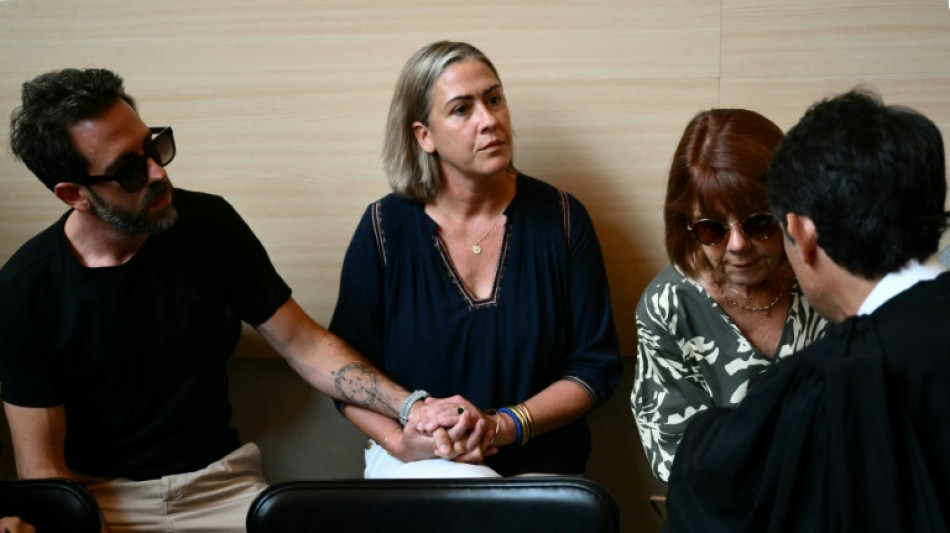
RYCEF
0.1700


The family of a French man who enlisted dozens of strangers to rape his heavily-sedated wife have been torn apart by his crimes but are still seeking answers after a gruelling three-month trial.
Dominique Pelicot, 72, has been on trial since September for masterminding the mass rapes of Gisele Pelicot by strangers who responded to his online invitation to visit the family home in Mazan, southern France.
Pelicot, who faces 20 years in jail after admitting the charges, and 50 other men are to be sentenced this week after a trial that has shocked France. The verdict is expected on Thursday.
Gisele Pelicot, 72, who was raped after being heavily drugged by her then-husband, has become a feminist icon during a trial, which she insisted be held in public with her name used as a warning to other potential victims.
But all family members suffered from Dominique Pelicot's crimes, in particular their two sons and daughter, their spouses and the grandchildren.
"An entire family has been destroyed," the elder son, David, 50, told the court in November.
"How could one imagine that the mastermind was someone who we thought was sane, loyal and who we trusted," said the daughter, Caroline.
She was the first member of the family to speak out over the trauma that shattered the family in a 2022 book entitled "And I Stopped Calling You Dad".
- 'Quest for truth' -
At the trial, David Pelicot also did not use the word father, speaking of "this man in the dock". Florian, 38, the younger brother, says he wants to "do a paternity test" because "he no longer sleeps at night".
"My world is collapsing, everything I had built for 50 years," said Gisele Pelicot, whose divorce was finalised just before the start of the trial.
On Monday, Dominique Pelicot made his latest attempt to apologise, asking the "forgiveness" of the family and hailing the "courage" of his ex-wife during the trial.
The two sons and daughter did not attend that hearing.
"Everyone is permanently affected by this horror," said lawyer Antoine Camus. Along with Stephane Babonneau, Camus represents all the family members at the trial.
"They have lost their innocence," said one of the daughters-in-law, Celine, in court.
"Before the trial, everyone was on a quest for the truth, asking 'who is this man in fact?", Camus told AFP.
"They didn't get an answer because Dominique Pelicot only says what he wants to say. As long as the proof is not waved in his face, he says nothing."
- 'The forgotten one' -
This lack of response was particularly tough for Caroline.
Investigators found photos of her naked on her father's computer, taken without her knowledge. In some, she appears asleep, dressed in her mother's underwear.
Her brothers urged Dominique Pelicot to come explain what had happened and whether Caroline had been subjected to the same abuse as her mother.
"If you still have a little humanity, (I would like) you to tell the truth about the actions you took towards my sister, who is suffering," said David.
Caroline feels like the "great forgotten one" of the trial: "Gisele was raped while drugged. The only difference between her and me is the lack of evidence concerning me," she said in court.
But the "family will continue to fight", said David, evoking the painful moves to build a new family life that erases Dominique Pelicot.
Caroline still campaigns to warn about the dangers posed by rapists who drug their victims. "She quickly understood that this case transcends family history and says something collective," said Camus.
By publishing her book in 2022 -- preserving the anonymity of her loved ones at a time when her mother preferred to remain in the shadows -- Caroline wrote that she wanted to "transform this mud into noble material", help the victims to overcome the "weight of shame" and "reject the unbearable".
Two years later, her mother insisted the trial be held in public.
"When she (Gisele Pelicot) saw the videos in May, she asked herself 'how was it possible that I was treated like that, like a rubbish bag, hundreds of times? That dozens of people could be found to rape an inert woman?'," said Camus.
"She said to herself 'What does that say about all of us as a society?'"
Gisele Pelicot was shown in May, on the advice of her lawyers, the videos her husband had made of the rapes that were later shown in court.
Her decision to hold the hearings in public put the rape debate on the international stage.
The mother and daughter see the future differently, said Camus. But they have a "common denominator", a broader struggle, and a mantra repeated by both: "Let shame change sides".
Y.Ishikawa--JT